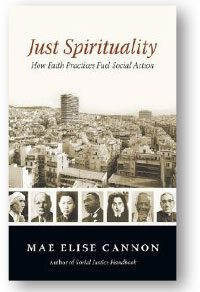 Just Spirituality: How Faith Practices Fuel Social Action
Just Spirituality: How Faith Practices Fuel Social Action
“I have a dream…” This familiar proclamation invokes sentiments of hope, justice, and dramatic social change. Indeed, these words from pastor and social activist Martin Luther King Jr. were part of the inspirational civil rights movement that paved the way for radical strides for social justice in the U.S. and around the world.
What inspires individuals to be a part of such courageous acts? Mae Elise Cannon demonstrates how Christian spiritual practices inspire and guide social action for several historical and contemporary Christian social activists. Just Spirituality tries to find its niche in a market crowded with studies of spiritual practice and books on the integration of faith and social justice by connecting distinct spiritual practices to sustained efforts to advocate for justice.
The book succeeds in providing an overview of the lives of several great historical social activists, and their understanding and practice of these spiritual disciplines, and resourcing readers with tools for practising these disciplines themselves. Unfortunately, Just Spirituality suffers from a thin theological connection to social justice. It’s great that spiritual disciplines – silence, prayer, study, community, worship, Sabbath, and submission – are identified as a way of drawing us closer to God. This simple theme, however, is repeated more often than developed in terms of application to social justice.
Some chapters do better than others at making this connection between spiritual discipline and social justice. The chapter on Martin Luther King Jr. and the focus on community and social justice make a naturally strong connection to being aware of injustices around you. Desmond Tutu’s story and the role of Sabbath insightfully highlight the concept of shalom as driving force behind the restoration of relationships and communities. Other chapters have a weaker link to social justice and focus more on self-care as a way of strengthening those working for social action.
The book seems intended to encourage individuals already working at social justice issues, vocationally or otherwise, rather than creating an impetus for neophytes to engage in social transformation. The chapter on the spiritual practice of silence, for example, identifies the challenge of prioritizing silence specifically for those who are “involved in movements of advocacy in justice.” In this regard, the book may be a helpful resource for those looking to connect spiritual disciplines with their area of vocational ministry.
Such high-profile examples risk leaving the reader with the understanding that social action is only embodied in grandiose movements, reserved for those who devote significant time to campaigns. Highlighting the ways that these spiritual disciplines prompted, guided, and sustained large-scale movements can be inspiring, but it also runs the risk of distancing social action from day-to-day life. To seek social justice does not necessitate joining or initiating a cause or campaign.
On the other hand, perhaps these examples will challenge readers to break out of comfort zones and acknowledge the injustices taking place in the world around us, whether on a global scale or in our own communities. Each chapter includes a Contemporary Praxis section that many will find a helpful guide to making spiritual disciplines more tangible. Unfortunately, the ways these disciplines are connected to social justice and activism are often simplistic and conventional: the chapter on the spiritual discipline of worship, for example, suggests hosting an evening worship service at church.
Perhaps the premise of this book is strengthened when paired with Cannon’s previous publication, Social Justice Handbook, which aims to connect an understanding of God’s desire for justice with practical advocacy tools and ways to take social action.
Just Spirituality is an interesting read for those wishing to review the lives of social activists with an eye on the spiritual disciplines they practised. The reflections are encouraging in that they help show how leaders of historic justice movements were ordinary people who also struggled with spiritual disciplines. The bottom line is that these disciplines lead us into closer relationship with God, a relationship that should prompt us to work for restoration and justice in our communities and around the world.
—Jared Klassen is Ottawa Office advocacy research intern for MCC Canada and a member of South Abbotsford MB Church, B.C.